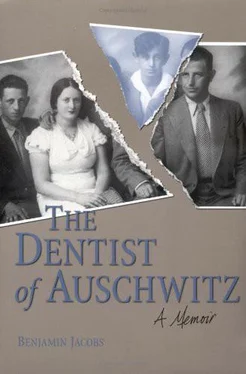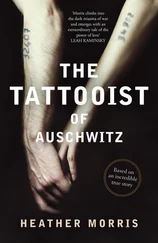Fifteen minutes later a whistle blared. “Quick! Quick! Everyone out to the yard for a roll call!” Then we learned another lesson. No one walked in Steineck. With Papa at my side, I rushed back through the same corridor toward the exit. An SS man, his dog at his side, awaited us. Using the same maneuver as before, I escaped a lashing. But this time the German shepherd buried his fangs in my thigh and shook his snout from side to side. When I freed myself, my pants were torn, and blood was running down my thigh. My leg hurt as if a dozen nails had been driven into it. I wanted to check my leg further, but I knew the roll call took precedence. I followed everyone else to the yard.
Early in 1941, long before the Wannsee conference at which the Nazis made killing Jews an official policy, Alfred Rosenberg, the Nazi Reichminister for occupied Warthegau, proposed labor camps for the Jews living in the region. In a widely reported speech at Poznan University, he said, “The Jews will have to pay with blood for the twenty-five years of suffering they have inflicted on the Germans and Poles here.” Like Rosenberg’s other proposals, this one received unanimous acceptance. In May 1941 the first Judenarbeitslager was established in the Sport-Stadium in Poznan. One thousand Jewish men were brought there from the Lodz ghetto. The second labor camp was Steineck.
The Kommandant from the Stadium camp directed our roll call. He had come here to set up Steineck. After we were ordered into rows of five, we had to count, one after another, until the guards were satisfied that all of us were present. After being released, I finally went to the washroom. Here a thirteen-meter pipe dripped water into a trough beneath it.
The washroom was a perplexing sight, an affront to dignity. A long, half-cylindrical cement object with pipes above it ran along two walls. Several shut-off valves were visible. The toilet was an unfinished plank of wood over a twenty-meter-long pit. Those using it who had diarrhea wound up with feces on their clothes. I cleaned my wound, washed off the blood around the two rows of teeth marks on my thigh, cleaned my underwear and pants, and left.
Papa had been waiting for me in the room, his head still hurting. The bell rang, announcing that it was time for our first food ration. The line extended twice around the corridor. After waiting for twenty minutes, we each received a “pica,” a wedge of bread weighing less than a fifth of a kilo, and something resembling coffee. The only element the dark liquid had in common with real coffee was its color. Bitter it was, and impossible to drink without sweetener. The bread wasn’t any better. It was old and stale and tasted of oats. “If this is a sample of our food here, we’ll starve to death,” someone remarked. Eating it seemed revolting at first. This food was not fit for animals, much less for humans. But in time, to stave off starvation, we all ate it.
The cook was a round-faced inmate by the name of Rachmiel. “Tomorrow,” he promised, “we’ll also get margarine and marmalade.”
When the bell rang in the morning, Papa had to nudge me awake. That morning we got the promised margarine. The cook hastily dispensed a spoonful of marmalade and slapped it on the “pica” of bread. It dripped off even before we turned around. Then came a call: “Eintreten!” Once again we counted off: “Eins, zwei, drei, vier.” Then we were ordered to undress and put our clothes in one pile for delousing. Barbers, most of whom had never cut hair before, clipped off our hair from head to toe. We became an unsightly spectacle to those passing the camp.
At noon, after searching in the piles, we found our clothes. They now had a strong odor of naphtha. Then we got an anemic mixture of turnips and potatoes as our midday ration. Though at first it turned our stomach, hunger eventually won over, and we ate it. In the afternoon there was another roll call, this one for the purpose of inspection. The SS men seemed to have a special interest in shirts and jackets that were totally buttoned. Five lashes were administered to those whose clothes were not fully buttoned, and the same punishment was meted out for leaving a shoelace untied.
Then came an exhibition of our marching, with which they were most displeased. The first lesson in marching “Nazi style” followed. The younger of us could adapt to it, but to my father and his peers, goose stepping was as strange as could be. And how could they expect Reb Yankev, a scholar who had lived according to God’s Law, to raise his legs and pound the ground, as goose stepping required? Just walking in line was strange to him, and he became the most abused. The soldiers made him fall down and drag himself on his elbows. Then he was ordered to get up and to repeat this. They ordered him to run until he broke down and collapsed. In the end, seeing his state of severe exhaustion and his inability to comprehend their commands, they whipped him mercilessly.
“Du Scheiss Jude” was the beginning of their standard curse, and accusations blaming us for all the world’s ills followed. Did they really believe that? Or was it a self-imposed justification? In any case, they enjoyed their roles. Although by now their castigation of us was familiar, the charges were hard to accept. I never understood what we had done to earn these allegations. Once dismissed, we sat down in groups, on the grass near the fence. Relaxing in the sunshine offered a bit of a physical and emotional boost. But the intellectuals, without respect or purpose, found it hard to defy their fate.
Today, we were reminded, was Shabbat. Even without a place of worship in the ghetto, we had still come together to pray. Here Shabbat was just another day. “It seems that all gods have been replaced by one, Adolf Hitler, and losing ours, we lost most,” someone in the group remarked.
To this, Reb Yankev couldn’t remain silent. “The Lord won’t let us suffer,” he predicted. “Thou alone wilt be exalted, and thou wilt reign over all in unity,” he prayed.
A strange quiet followed. It seemed as if everyone’s thoughts questioned this wisdom. A few minutes passed, and my father, as if in an afterthought, made the most optimistic remark. “It’s only a matter of months,” he said. This reminded me how much Mama must be missing him. They depended so much on each other, especially in a time of crisis.
I looked at David Kot, a good friend of mine. At home our two families had been very close. I had spent many days at his house, and he at ours. His once heavy head of hair and the brave and alert look in his black eyes were gone. What’s more, our careless and happy adolescent life had been cut short, and the intimacy we once enjoyed was no longer there. A sudden ring of the bell announced the time for evening’s rations.
Sunday morning I woke amazingly early. Everything—the whistles, the whips, and the barking of the dogs—already seemed routine. After the roll call, the Kommandant asked doctors, cooks, and tailors to come forward. There were no doctors among us, but more than enough cooks and tailors. As an alternative, he picked Goldstein, a barber from Dobra, to be in charge of the first aid room. It only stocked a few bandages, some iodine, and aspirin.
Rachmiel got four more as kitchen help. So many envied this job that people battled for it. In addition to offering extra food, the kitchen was always warm, and the work wasn’t exhausting. A camp tailor and four inmates to serve as extra police were also selected. The rest of that Sunday was free. When the bells called lights out, it was still daylight. In our bunks, however, we saw only unfinished wood. The nights were still cool, but the combined body heat of eighty or more inmates in our room was enough to make one sweat. I watched my father as he pulled himself into his bunk, careful to avoid splinters.
Читать дальше












